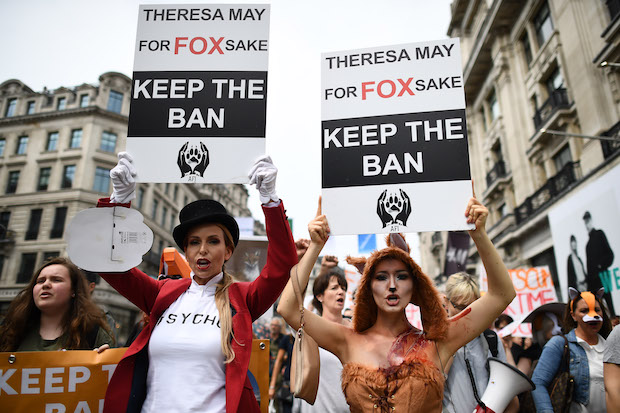Although the Boxing Day hunt is one of the biggest events of the year for the hunting community, it’s safe to presume that the Christmas cheer at yesterday’s hunt was dampened by reports the Prime Minister is expected to abandon all plans for a free vote to overturn the fox hunting ban. After having to bin the manifesto pledge to bring forward a free vote on the Hunting Act in this parliamentary session, Theresa May is reported to be preparing to go one step further in the new year and announce plans to drop the commitment permanently.
As I write in the i paper today, it was only really a matter of time until the Tories turned their attention to fox-hunting. The Prime Minister’s personal endorsement of the pursuit during the campaign is seen as one of the main factors behind the party’s disappointing result. Although many in the party didn’t spot it at the time, May’s proposal to reintroduce fox hunting with a free vote became the single most viral topic of the election – and not in a good way. A Survation poll taken days before the election found that more than two thirds of voters believe fox-hunting should remain illegal. Meanwhile, Labour’s policy to keep the fox-hunting ban was the party’s most popular according to election polling.
The Prime Minister is now under pressure from figures within her party to take a strong stand on fox-hunting as part of her party’s bid to de-toxify and win back metropolitan voters. As part of this, Michael Gove has rebranded himself as an eco-warrior and MPs have been told that the Tories should aim to be the party of the environment. It follows that some are reaching the conclusion that being seen as a pro-fox hunting party isn’t fully cohesive with with a pro-animal rights image.
However, the Boxing Day hunt, which sees around 250,000 people gather at hunts nationwide, is a reminder of why May is caught between a fox and a hard place. As well as upsetting Tory activists in rural areas, a permanent ban risks damaging the Tories’ skeleton ground game further. With door-knocking activists thin on the ground nowadays, hunt lobbying groups are valued within the party for getting their supporters to help out canvassing.
For many Tories this is a trade-off that must be made. Although David Cameron declared after the 2015 election that ‘Britain and Twitter are not the same thing’, the party feels stung by social media after seeing the negative effect viral stories – which often centre around animal rights – can have on the party. It’s bad enough when those stories are based on fake news (such as when news outlets reported that Tory MPs had voted against animal sentience) without the Tories doing their opponents’ work for them. It follows that a new consensus is developing that social networks ought to be prioritised over canvassers.
Even if May does make the rumoured announcement, it’s not clear it will have the desired effect. Just yesterday Labour launched a series of targeted ads calling on members to put pressure on the Tories to axe plans for a vote. If they do, it may just look like they were pushed into a corner – after all, the Tories’ stance in the snap election wasn’t a blip. When May declared fox-hunting as something she has ‘always been in favour of’, she joined a long list of prominent Tories to endorse the pursuit. For all the talk of David Cameron’s Tory modernisation, he was pictured at a hunt before the practice was banned and a ‘friend’ of his is quoted in Tim Shipman’s new 2017 election book Fall Out as saying that when it comes to the current political fracas, Cameron is ‘more interested in what animal he’s going to shoot, or what claret he’s going to have for lunch!’ Even the newly green Defra Secretary Michael Gove was seen as being ‘for’ lifting the ban as recently as the summer.
This begs the question: will the current Conservative party be believed if it takes an anti-fox-hunting stance?







Comments